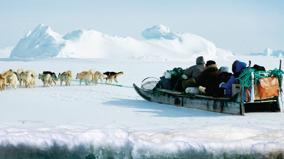Force of Nature: The David Suzuki Movie
This feature documentary profiles the life and work of world-renowned Canadian scientist, educator, broadcaster and activist David Suzuki on the occasion of his last lecture in 2009—a lecture he describes as “a distillation of my life and thoughts, my legacy, what I want to say before I die.” As Suzuki reflects on his family history—including the persecution of Japanese Canadians during WWII—and his discovery of the power and beauty of the natural world, we are spurred to examine our own relationship to nature, scientific knowledge, and sustainability throughout modernity and beyond.

Details
-
writerSturla Gunnarsson
-
directorSturla Gunnarsson
-
lecture writerDavid Suzuki
-
executive producerLaszlo BarnaSteven SilverTracey FriesenMichael AllderRachel SmithLeigh AshurstJeff Hasler
-
producerJanice TuffordSturla GunnarssonYves J. Ma
-
editorNick Hector
-
director of photographyTony Westman
-
lead camera assistantKim MacNaughton
-
production designerDany Lyne
-
line producerSarah James
-
unit managerWendy Ord
-
associate producerDavid TuckerVance Chow
-
visual researchElizabeth Klinck
-
music clearancesElizabeth Klinck
-
additional photographyJohn HoloskoA.J. Vesak
-
camera operatorRobin ForstBrenton SpencerKirk Tougas
-
camera assistantNicholas McKenzieReg GoleRobert SimpsonApril HallTakashi Chiba
-
technical assistantAri Rajin Gunnarsson
-
sound recordistRoderick MatteShawn MillerSammy YiRylan Kerbes
-
production coordinatorJason LambertJennifer RoworthMarty Coffou
-
technical directorTimothy O'Gorman
-
production stage managerMaria Popoff
-
lighting directorJason McKinnon
-
lighting board operatorRobert Sondergaard
-
projection designerSean Nieuwenhuis
-
gafferSimon Hunt
-
key gripDavid Hutton
-
gripDavid Haywood McMartinEdwin (Ted) Fanyeck
-
dolly gripTony Hyland
-
location supportAya AsakurJim Gillman
-
production accountantPaul Zonneveld
-
post-production supervisorSonia Shields
-
post-production assistantEmma Stoliker
-
imaging supervisorNick Iannelli
-
digital intermediate producerPeter Armstrong
-
digital intermediate project managerLee Hughes
-
colouristChris Wallace
-
online editorKevin Downer
-
audio post-productionTattersall Sound & Picture
-
sound mixMartin Lee
-
assistant sound mixerMandy Ley
-
sound editorMichael Bonini
-
assistant editorSam Ellens
-
editing internMel Aravena-EdwardhAshley Brook
-
still photographerJack Rowand
-
production assistantStephen KronsteinLeigh ButcherAndrea BluntPam GilliesOmar LundieAndrea Tully
-
supervising executive in charge of productionMargaret O'Brien
-
vice-president, documentary developmentLoren Mawhinney
-
legal affairsJohn Robinson
-
head of factual productionPim van der Toorn
-
director, production financingVanessa Steinmetz
-
business affairs analystDerek Moser
-
managerMelissa Williamson
-
executive vice-president, international distributionCharlotte Mickie
-
vice-president marketingTamara Shannon
-
manager, business & legal affairsGiovanna Mazzuca
-
deliveries managerAnne Reynolds
-
centre administratorBruce Hagerman
-
marketing managerMoira Keigher
-
general managerKirstine Stewart
-
executive directorJennifer Stewart
Education
Pedagogical evaluations and study guides are only available to CAMPUS subscribers.
CAMPUS
Features designed specifically for teachers. Learn more
Already subscribed? Sign in











